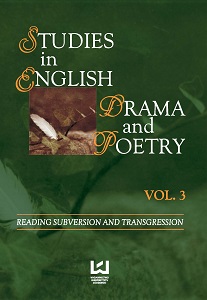Freedom above the Law: Friedrich Schiller’s Die Räuber
Freedom above the Law: Friedrich Schiller’s Die Räuber
Author(s): Bodas Fernández Lucía
Subject(s): British Literature
Published by: Wydawnictwo Uniwersytetu Łódzkiego
Keywords: Freedom above the Law;Friedrich Schiller;Die Räuber
Summary/Abstract: The aim of this paper is to analyze one of the most problematic works of the German poet and philosopher, Friedrich Schiller: his first play, Die Räuber (The Robbers, 1782). Following Hammer and Hart’s Gadamerian literary hermeneutics, I will focus on the subversive role that Schiller attaches to the figure of the criminal in this work. Written seven years before the French Revolution, the play has traditionally been interpreted as a pre-revolutionary drama that stresses the emancipatory power of the Enlightenment and the Revolution. The way in which Schiller appears to use the dichotomy between criminal and society supports this view: the noble criminal opposes the Law as the incarnation of a severe and narrow rationalism. However, the shared tragic end of the Moor brothers, the protagonists of the play, proves the enlightened emancipation to be fallible and reveals its inner despotic potential. This is not due to the final retrograde meaning or because the play is not intimately concerned with freedom and individual autonomy. Instead, its ultimate aim is not to be propagandistic, or even constructive, but harshly critical, uncovering and bearing witness to the oppressive character of Schiller’s contemporary society and its public (penal system) and private (family) institutions. Subverting the traditional association between criminal-evil/compliant-good and virtuerecompense/vice-punishment, Schiller breaks up with the retributive logic on which he does not rely, as if it were a kind of unrecognized superstition that undermines autonomous thinking and action. Through this reversal, Schiller exposes the irrational bases of the retributive urge rooted in Christian humanism, which is not founded upon true justice but upon vengeance and the heteronomy of transcendent concepts that cannot support an autonomous moral.
Book: Studies in English Drama and Poetry vol. 3. Reading subversion and transgression
- Page Range: 45-54
- Page Count: 10
- Publication Year: 2013
- Language: English
- Content File-PDF

